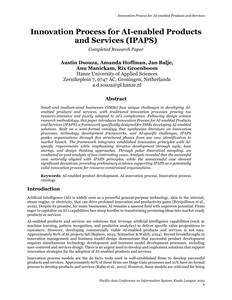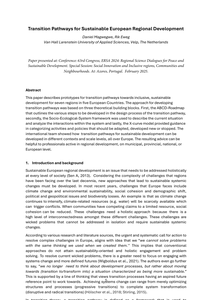Small and medium-sized businesses (SMBs) face unique challenges in developing AI-enabled products and services, with traditional innovation processes proving too resource-intensive and poorly adapted to AI's complexities. Following design science research methodology, this paper introduces Innovation Process for AI-enabled Products and Services (IPAPS), a framework specifically designed for SMBs developing AI-enabled solutions. Built on a semi-formal ontology that synthesizes literature on innovation processes, technology development frameworks, and AI-specific challenges, IPAPS guides organizations through five structured phases from use case identification to market launch. The framework integrates established innovation principles with AI-specific requirements while emphasizing iterative development through agile, lean startup, and design thinking approaches. Through polar theoretical sampling, we conducted ex-post analysis of two contrasting cases. Analysis revealed that the successful case naturally aligned with IPAPS principles, while the unsuccessful case showed significant deviations, providing preliminary evidence supporting IPAPS as a potentially valid innovation process for resource-constrained organizations.
MULTIFILE

Recently, the job market for Artificial Intelligence (AI) engineers has exploded. Since the role of AI engineer is relatively new, limited research has been done on the requirements as set by the industry. Moreover, the definition of an AI engineer is less established than for a data scientist or a software engineer. In this study we explore, based on job ads, the requirements from the job market for the position of AI engineer in The Netherlands. We retrieved job ad data between April 2018 and April 2021 from a large job ad database, Jobfeed from TextKernel. The job ads were selected with a process similar to the selection of primary studies in a literature review. We characterize the 367 resulting job ads based on meta-data such as publication date, industry/sector, educational background and job titles. To answer our research questions we have further coded 125 job ads manually. The job tasks of AI engineers are concentrated in five categories: business understanding, data engineering, modeling, software development and operations engineering. Companies ask for AI engineers with different profiles: 1) data science engineer with focus on modeling, 2) AI software engineer with focus on software development , 3) generalist AI engineer with focus on both models and software. Furthermore, we present the tools and technologies mentioned in the selected job ads, and the soft skills. Our research helps to understand the expectations companies have for professionals building AI-enabled systems. Understanding these expectations is crucial both for prospective AI engineers and educational institutions in charge of training those prospective engineers. Our research also helps to better define the profession of AI engineering. We do this by proposing an extended AI engineering life-cycle that includes a business understanding phase.
LINK
In November 2019, scholars and practitioners from ten higher education institutions celebrated the launch of the iKudu project. This project, co-funded by Erasmus [1], focuses on capacity development for curriculum transformation through internationalisation and development of Collaborative Online International Learning (COIL) virtual exchange. Detailed plans for 2020 were discussed including a series of site visits and face-to-face training. However, the realities of the COVID-19 pandemic disrupted the plans in ways that could not have been foreseen and new ways of thinking and doing came to the fore. Writing from an insider perspective as project partners, in this paper we draw from appreciative inquiry, using a metaphor of a mosaic as our identity, to first provide the background on the iKudu project before sharing the impact of the pandemic on the project’s adapted approach. We then discuss how alongside the focus of iKudu in the delivery of an internationalised and transformed curriculum using COIL, we have, by our very approach as project partners, adopted the principles of COIL exchange. A positive impact of the pandemic was that COIL offered a consciousness raising activity, which we suggest could be used more broadly in order to help academics think about international research practice partnerships, and, as in our situation, how internationalised and decolonised curriculum practices might be approached. 1. KA2 Erasmus+ Cooperation for innovation and the exchange of good practices (capacity building in the field of Higher Education)
DOCUMENT

In recent years there has been much emphasis on 'research waste' caused by poor question selection, insufficient attention to previous research results, and avoidable weakness in research design, conduct and analysis. Little attention has been paid to the effect of inadequate development of interventions before proceeding to a full clinical trial. We therefore propose to enrich the development phase of the MRC Framework by adding crucial elements to improve the likelihood of success and enhance the fit with clinical practice METHODS: Based on existing intervention development guidance and synthesis, a comprehensive iterative intervention development approach is proposed. Examples from published reports are presented to illustrate the methodology that can be applied within each element to enhance the intervention design.
DOCUMENT

Reading and writing is modelled in CSP using actions containing the symbols ? and !. These reading actions and writing actions are synchronous, and there is a one-to-one relationship between occurrences of pairs of these actions. In the CPA conference 2017, we introduced the extended half-synchronous al- phabetised parallel operator X ⇕ Y , which disconnects the writing to and reading from a channel in time; the reading processes are divided into sets which are set-wise asynchronous, but intra-set-wise synchronous, giving full flexibility to the reads. In this paper, we allow multiple writers to write to the same channel set-wise asynchronously, but intra-set-wise synchronously and we study the impact on our (Extended) Vertex Removing Synchronised Product. The advantages we accomplish are that the extension of X ⇕ Y gives more flexibility by indexing the writing actions and the reading actions, leading to a straightforward majority vote design. Furthermore, the extension of X ⇕ Y preserves the advantages of the X ⇕ Y operator.
DOCUMENT

De zorgsector wordt in toenemende mate geconfronteerd met uitdagingen als gevolg van groeiende vraag (o.a. door vergrijzing en complexiteit van zorg) en afnemend aanbod van zorgverleners (o.a. door personeelstekorten). Kunstmatige Intelligentie (AI) wordt als mogelijke oplossing gezien, maar wordt vaak vanuit een technologisch perspectief benaderd. Dit artikel kiest een mensgerichte benadering en bestudeert hoe zorgmedewerkers het werken met AI ervaren. Dit is belangrijk omdat zij uiteindelijk met deze applicaties moeten werken om de uitdagingen in de zorg het hoofd te bieden. Op basis van 21 semigestructureerde interviews met zorgmedewerkers die AI hebben gebruikt, beschrijven we de werkervaringen met AI. Met behulp van het AMO-raamwerk - wat staat voor abilities, motivation en opportunities - laten we zien dat AI een impact heeft op het werk van zorgmedewerkers. Het gebruik van AI vereist nieuwe competenties en de overtuiging dat AI de zorg kan verbeteren. Daarbij is er een noodzaak voor voldoende beschikbaarheid van training en ondersteuning. Tenslotte bediscussiëren we de implicaties voor theorie en geven we aanbevelingen voor HR-professionals.
MULTIFILE
Reading and writing is modelled in CSP using actions containing the sym- bols ? and !. These reading and writing actions are synchronous and there is a one- to-one relationship between occurrences of pairs of these actions. It is cumbersome to ease the restriction of synchronous execution of the read and write actions. For this reason we introduce the half-asynchronous parallel operator that acts on actions con- taining the symbols ¿ and ¡ and study the impact on a Vertex Removing Synchronised Product.
DOCUMENT

This paper describes prototypes for transition pathways towards inclusive, sustainable development for seven regions in five European Countries. The approach for developing transition pathways was based on three theoretical building blocks. First, the ABCD-Roadmap that outlines the various steps to be developed in the design process of the transition pathway, secondly, the Socio-Ecological-System framework was used to describe the current situation and analyze the interactions within the system and lastly, the X-curve model provided guidance in categorizing activities and policies that should be adapted, developed new or stopped. The international team showed how transition pathways for sustainable development can be developed in different contexts and scale levels, all over Europe. The resulting advice can be helpful to professionals active in regional development, on municipal, provincial, national, or European level.
DOCUMENT

Over the past three years we have built a practice-oriented, bachelor level, educational programme for software engineers to specialize as AI engineers. The experience with this programme and the practical assignments our students execute in industry has given us valuable insights on the profession of AI engineer. In this paper we discuss our programme and the lessons learned for industry and research.
MULTIFILE

Reading and writing is modelled in CSP using actions containing the symbols ? and !. These reading actions and writing actions are synchronous, and there is a one-to-one relationship between occurrences of pairs of these actions. In the CPA conference 2016, we introduced the half-synchronous alphabetised parallel operator X ⇓ Y , which disconnects the writing to and reading from a channel in time. We introduce in this paper an extension of X ⇓ Y , where the definition of X ⇓ Y is relaxed; the reading processes are divided into sets which are set-wise asynchronous, but intra-set-wise synchronous, giving full flexibility to the asynchronous writes and reads. Furthermore, we allow multiple writers to the same channel and we study the impact on a Vertex Removing Synchronised Product. The advantages we accomplish are that the extension of X ⇓ Y gives more flexibility by indexing the reading actions and allowing multiple write actions to the same channel. Furthermore, the extension of X ⇓Y reduces the end-to-end processing time of the processor or coprocessor in a distributed computing system. We show the effects of these advantages in a case study describing a Controlled Emergency Stop for a processor-coprocessor combination.
DOCUMENT
